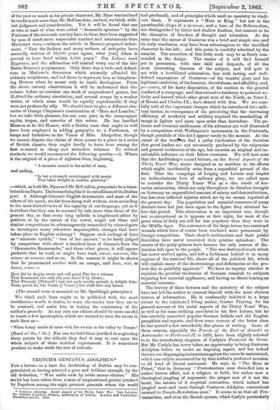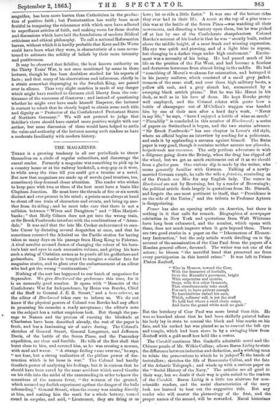TRENCH'S GUSTAVUS ADOLPHUS.* Fon a lecture on a hero the
Archbishop of Dublin may be con- gratulated on having selected a pure and brilliant example, by the old definition, "Who noble ends by noble means obtains." His model has been taken from a man of unquestioned genius (ranked by Napoleon among the eight greatest generals whom the world
* Gustavus Adotplau, Social Aspects of tat Thirty Years' War. Two Lectures BY Itiobard ebenerlxsTrench, Atrabbishop of Dublin. Laidon and Cambridse: Macmillan and Co. 1865.
had produced), and of principles which need no casuistry to vindi- cate them. It represents a "Hero as King," but not in the questionable shape of a tyrannus, and a hero of the Reformation, not distinguished by bitter and shallow finalism, but content to be the champion of freedom of thought and toleration. At the same time the career of Gustavus was a brief and simple one, and its early conclusion may have been advantageous to the unsullied character he has left ; and this point is candidly admitted by the essayist. The execution of this little work may be as freely com- mended as the design. The reader of it will find himself put in possession, with rare skill and despatch, of all the most interesting features of the subject, and will quit it not with a bewildered admiration, but with lasting and well- defined impressions of Gustavus—of his trustful piety and his legitimate ambition, of his humour, cheerfulness, and affability, and, per contra, of his hasty disposition, of his caution in the general conduct of a campaign, and that excessive tendency to personal ac- tivity and hazard which other great men of the North, as Peter I. of Russia and Charles IX., have shared with him. We are care- fully told of the important changes which he introduced into mili- tary tactics, in consequence of his perceiving that the increasing efficiency of musketry and artillery required the marshalling of troops in lighter and more open order than heretofore. The pa- tience and eventual suddenness of his advances are well illustrated by a comparison with Wellington's movements in the Peninsula, though parallels of this kind appear rarely in the memoir. At the outset of the worillwe find a pithy vindication of the doctrine that great leaders are not necessarily produced by the exigencies and general tendencies of the age, but exercise an original and in- calculable influence on their fellow-creatures. We will here note that the Archbishop's second lecture, on the Social Aspects of the Thirty Years' War, seems designed as an antidote to the effects which might incidentally arise from a superficial perusal of the first. That the campaign of Leipzig and Lutzen may inspire no indiscriminate love of military glory, ive are called upon to consider the Thirty Years' War as a dire result of sec- tarian animosities, which not only throughout its duration brought on Germany an unparalleled amount of misery and demoralization, but has even inflicted injuries which are by no means repaired at the present day. The population and material resources of many districts have but just risen again to the figure they attained be- fore this period. This observation is an important one, though not so exceptional as it appears at first sight, for most of the great cities of Italy are still far less populous than they were in the Middle Ages. The commerce of the large towns has sustained wounds which have of course been rendered more permanent by- foreign competition. Their church architecture and their public festivities have never recovered their pristine splendour. The courts of the petty princes have become the only sources of dis- tinction left open to the people. "The war destroyed much which has never revived again, and left a feebleness behind it in many regions of the national life, above all of the political life, which will explain many of the shortcomings and deficiencies at the pre- sent day so painfully apparent." We have no inquiry whether it explains the peculiar tendencies of German research to subjects requiring few material appliances, and having no direct bearing on material interests.
The brevity of these lectures and the notoriety of the subject have not led the author to content himself with the most obvious sources of information. He is confessedly indebted to a large extent to the celebrated living author, Gustav Freytag, for his general account of the social aspects of the Thirty Years' War, as well as for some striking anecdotes in his first lecture, but he has carefully consulted popular German ballads and old English pamphlets and reports, and from some sources of the latter class he has quoted a few remarkably fine pieces of writing. Some of these sources, especially the Travels of the Earl of Arundel as Ambassador to Ferdinand II. in 1636, have been slightly referred to in the introductory chapters of Carlyle's Frederick the Great. But Mr. Carlyle has never taken an opportunity to bring Gustavus Adolphus before us under an imposing aspect, and has indeed thrown out disparaging insinuationsagainst the cause he maintained, which can only be accounted for by that author's professed aversion to all kind of liberal sentiment. He says, in "The Hero as Priest," that in Germany "Protestantism soon dwindled into rather barren affair, not a religion or faith, but rather now a theological jangling of argument, the proper seat of it not the heart, the essence of it sceptical contention, which indeed has jangled more and more through Gustavus -Adolphus contentions onward to French-Revolution ones." It seems to us that all Prcr- testantism, and even the Scotch system, which Carlyle particularly
magnifies, has been more barren than Catholicism in the produc- tion of positive faith ; but Protestantism has really been most fruitful in tempering the vehemence with which men have adhered to superfluous articles of faith, and making room for those doubts and discussions which have laid the foundations of modern Biblical criticisms and ethical philosophy. To call a national Reformation barren, without which it is hardly probable that Kant and De Wette could have been what they were, is characteristic of a man accus- tomed to estimate the solidity of beliefs by their mere intensity and positiveness.
It may be observed that Schiller, the best known authority on the Thirty Years' War, is not once mentioned by name in these lectures, though he has been doubtless studied for his reports of facts ; and that many of his observations and inferences, chiefly in a strain somewhat disparaging to the Swedish King, are passed over in silence. Thus very slight mention is made of any danger which might have resulted to German civil liberty from the con- tinuance of the successes of Gustavus ; and instead of questioning whether he might ever have made himself Emperor, the lecturer is content to admit that he clearly hoped to obtain some such title and dignity as " Protector of the Confederated Protestant States of Northern Germany." We will not pretend to judge that Schiller's views should have carried more positive weight with our author, but some discussion of them would have helped to settle the value and authority of the lectures among such readers as have a moderate familiarity with modern history.































 Previous page
Previous page